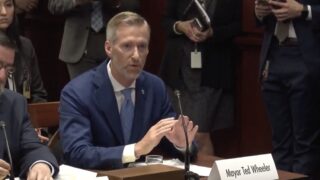
Senate Democrats learned what mayors are doing to combat climate change during the first meeting of their Special Committee on the Climate Crisis held today on Capitol Hill in Washington D.C. Portland Mayor Ted Wheeler was one of the five mayors invited to offer testimony and answer the Senators’ questions.
Prior to his appearance, Mayor Wheeler tweeted that leaders like him are on the “frontlines of the climate crisis” and, “on the frontlines of climate action.”
“Portland is working hard to make biking, walking and transit, the easiest fastest and most effective way to get around in our community.”
When given the chance to present testimony (watch video below), Wheeler spoke for about seven minutes and framed his remarks around his view that climate change is, “the greatest threat we face in this generation.” There were three main points in Wheeler’s testimony: that green initiatives can make cities rich, that more action is needed, and that those actions must to be “people-centered”.
It was in that second point that Wheeler went into depth on transportation issues. Reminding Senators of the International Panel on Climate Change (IPCC) report that says we have about 10 years to act to prevent irreversible damage. “We’re out of time, and we know we need to take big, bold steps,” Wheeler said.
Wheeler’s prepared remarks submitted to the committee included the fact that despite Portland’s green reputation, our emissions from the transportation sector are, “going in the wrong direction” and are up 8% from 1990 levels.
Advertisement
Then he went into specifics on how Portland is addressing that alarming trend:
“We’re doubling down on ways to create more effective transit options. Portland is working hard to make biking, walking and transit, the easiest fastest and most effective way to get around in our community. We’re also investing in transit-only lanes and other strategies to make our bus service faster, cleaner and more reliable with the overall goal of significantly increasing ridership. We need to more than double transit ridership between now and 2035 to meet our aggressive goal which is 25% transit mode share. It’s an ambitious goal but our transportation commissioner our transportation bureau and our city planners have proven they are up to that challenge.”
His printed testimony (which he didn’t read verbatim) went into even greater detail about Portland’s transportation plans. It included a spotlight on PBOT’s Central City in Motion program which Wheeler said will roll out three major transit investments in the next 18 months and add 1.54 miles of bus-only lanes in the central city. “The Central City in Motion projects will also improve bicycle safety by adding dedicated, protected bike lanes in several central
city locations,” the testimony reads.
Another thing that caught my attention was when “bike lanes” found their way into Wheeler’s remarks among a list of “technical solutions that will only get us so far” that also included solar panels, home insulation and electric buses. It’s unclear why bike lanes, which we’ve been striping since the 1970s, would be considered a “technical solution.”
After each mayor spoke, Senators asked them questions. Wheeler was asked by Senator Martin Heinrich (D-NM) to share one thing he’s done particularly well in tackling the climate issue.
“I would argue that top-down, hierarchical leadership only gets you part of the way,” Wheeler answered. Then he continued:
“In order to really be successful in achieving climate action goals it has to come to the community as well. I think of everything we’ve done from — zoning changes to the built environment, reducing our wastestream through recycling, our ban on single-use plastics, our 100% renewable energy pledge… the real leadership is coming from the community… Sometimes you really have to let the community take the lead. Then as leaders, we have to facilitate what comes next.”
One major climate issue that the community has taken the lead on is that we shouldn’t expand freeways to encourage more driving capacity in the central city. On that issue, Wheeler hasn’t facilitated what the community wants. In fact, he supports an Oregon Department of Transportation project that will add several new lanes for driving on Interstate 5 through the Rose Quarter despite severe opposition from numerous community and environmental groups.
Notably, Wheeler’s remarks did not include a mention of the freeway expansion or its “auxiliary lanes”, even though ODOT says it will be a net positive for air quality and the environment.
Committee Chair Senator Brian Schatz (D-HI) said this was the first of what will be many hearings on the climate crisis. Learn more on the committee’s website.
— Jonathan Maus: (503) 706-8804, @jonathan_maus on Twitter and jonathan@bikeportland.org
Never miss a story. Sign-up for the daily BP Headlines email.
BikePortland needs your support.



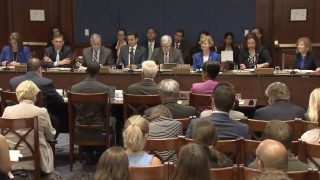
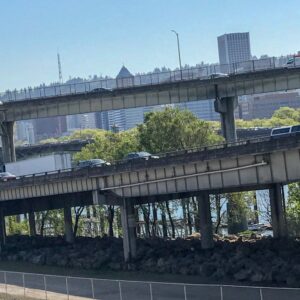
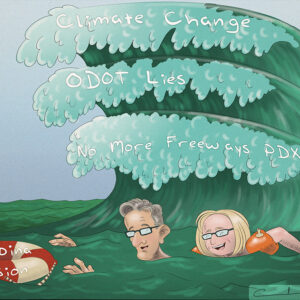
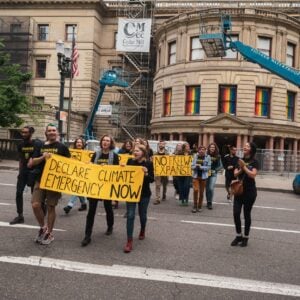
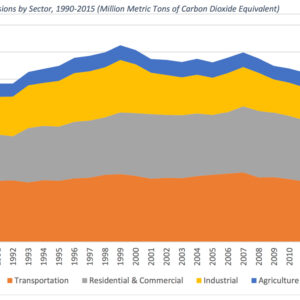
Thanks for reading.
BikePortland has served this community with independent community journalism since 2005. We rely on subscriptions from readers like you to survive. Your financial support is vital in keeping this valuable resource alive and well.
Please subscribe today to strengthen and expand our work.
Wow, this is delusional on a Trumpian level….. Wheeler has done nothing and I mean nothing about climate change or anything else.
Are there any Wheeler fans out there? Can you or him tell me One thing he has done in office?
Anything?
Granting carte blanche to any developer to build about anything is so far from anything Wheeler thinks he is doing..
Laughable on so many levels.
I think he’s coming around. Does he have any comments on the recent agreement between WashDOT and C-Tran intergovernmental agreement for a bus lane to the I-5 Bridge?
https://www.c-tran.com/images/Intergovernmental_Agreements/2019/GCB_3196_CTRAN_I-5_BOS_Executed_7-11-19.pdf
Roberta – thanks for that new CTRAN item I was not aware of. (SR-14 shoulder running lane has been functioning for awhile.)
I am sure most regional drivers did not know there used to be a SB HOV lane there as part of the widening of I-5 from the late 1990s until WSDoT removed it…it truly needed to cross the bridge and have an ODoT section too. https://www.rtc.wa.gov/press/release.asp?id=70
We’ve been hearing the same mantra for several decades now but we have not seen the dire consequences in a catastrophic enough way for the majority of people to tell their respective governments to do anything about it. This is one reason why people will not refer to it as a crisis.
We also know that bureaucratic organizations are also often poorly equipped to act quickly, so I am encouraged to hear Ted commenting on the need for communities to foster the change and for the bureaucracy to facilitate that…as best they can.
Bike lanes are still the most common dedicated infrastructure available for people riding bikes in Portland. Many times I’ve been grateful for a strip of pavement that wasn’t also traveled by every other vehicle on the road but that occasional bit of cover is not enough. Unpermitted construction activity, debris, snow and ice, delivery vehicles, official cars, etc. all plainly show that bike riding is far down the food chain. The city could improve active transportation mode share right now without building a damn thing.
“Bike Lanes” is a euphemism for any kind of bicycle-related infrastructure or facility for the 95% who never bike, including most politicians in DC. It’s not meant to be just those primitive 1970s painted lines that direct cars to stay in their lane, but also barrier-protected bike lanes, cycletracks, bike super highways, bike lockers, bike signals, etc etc. When you are talking to ignorant politicians, as he was, you have to use their primitive non-technical language and meanings if you want them to listen to what you are saying.
I’m less interested in “what is a bike lane” and more concerned with the message sent by the condition of bike Lanes. Snow gravel in June, construction encroachment, missing signs and worn off stripes. Those things are telling.
Add to your list: PBOT projects that start in October, are left half completed, and finished the following spring; blackberry vines; fallen tree limbs that are cleared from the general purpose lane but left in the bike lane; catch basins which are uneven with the surrounding pavement; blocked catch basins which create streams in the bike lane during heavy rain; “Road Work Ahead” signs in the bike lane, followed by “Bike Lane Closed Ahead” signs; bike lanes that end suddenly (e.g., SW 4th northbound after it crosses over I205;) etc.
He’s a good bullshit artist, I’ll give him that much. Orwell would be impressed.
I’m not sure that “climate change” is going to to be ameliorated at the local level. Seems like a federal level issue. Adding bike lanes in a mid-sized city isn’t going to do it. Not sure what his participation in this hearing added. Maybe he’s providing examples of local solutions that can be mandated at a federal level?
You’re advocating for allowing our most backwards citizens and the Senators they elect to kill off the biosphere. I know you don’t mean it that way, but by saying the only path to success is federal action, that’s what it comes down to.
I see it differently. If each and every American who understands that climate change is an existential threat far greater than any humanity has ever faced would lower their individual emissions to two tons CO2e/yr right now, we’d be well on our way to where we need to be by 2030 (or 2025, if the most dire recent findings are confirmed). Of course a big part of that will be foregoing all flying, most indoor climate control and almost all driving. That will put quite a few folks on bikes/transit which will get that city/county/state action that can eventually help get us a federal response.
Right now, what red stater is going to take warnings of climate change seriously when they look at the emissions profiles of those calling for action and see our behavior does not match our rhetoric?
Put another way, would we have ever ended our invasion of Viet Nam if not for people willing to go to prison or lose their citizenship over the draft? Are we so addicted to our luxuries that we cannot give them up even for the lives of our children? It’s disheartening to think that may well be the case.
“You’re advocating for allowing our most backwards citizens and the Senators they elect to kill off the biosphere.”
the arrogance and disdain imbedded in this statement is part of why the national discourse is mucked up.
Yes, it seems more likely that our federal government will do little to address climate change, and waiting for their lead is a sure means to disaster. In the meantime, it’s absolutely necessary that individuals take steps to dramatically reduce their own carbon footprints as you suggest. Unfortunately our (western American) culture is moving ever further from seeing personal responsibility as an endemic part of the personal freedom we are afforded, and so those needed individual actions are shoved aside with excuses in the form of maxims:
“How can I live if I don’t drive everywhere?”
“Sounds great if you live alone but I have a family and a job”
“One person won’t make a real difference anyway.”
“It’s because our whole system is messed up, it’s not my fault.”
“I’m not actually worried, someone will find a solution.”
No. EVERYONE needs to act, and quickly.
Good god the self-righteous malthusian preacher act is tiresome. Ineffective too!
Continued inaction on climate change by the majority of people and the constant excuses is tiresome. Feeling guilty about not doing your part? Obviously the solution is to attack the message you dislike.
Your absolutely right, standing on the (digital) street corner ranting that the “end is nigh!” and demanding that people repent or burn in hel… err 100 years or so, is how you win elections and implement policy.
I’ll go ahead and add denial of there being a climate change problem to the list of excuses for you, does that help your opinion feel included?
Resopmok rof Royam!
Mayor Wheeler: publically change the city’s support of ODOT’s I-5 Rose Quarter expansion to an unconditional rejection of it. Propose that the money saved be redirected to active transportation and transit. Then I’ll believe.
Plenty of people, myself included, (rightly) beat him up for his championing a freeway expansion in the Rose Quarter.
But let’s also call him out for removing Better Naito at the end of last season. I know it’s since returned (again, seasonally), but we sure tried to keep it in last fall and (unlike the RQ project) this was firmly in his control. When push came to shove, he removed bicycle/pedestrian infrastructure so that it could be yet one more car lane (apparently the 3-4 lanes dedicated to SOV motorists weren’t enough.) Completely inconsistent with his lip service about “working hard to make biking, walking and transit, the easiest fastest and most effective way to get around in our community.”
Jonathan, can you expand on your comments about community support? Wheeler would likely argue that a significant and substantial portion of the community (read: city population) supported movements to, using examples he volunteered, ban plastic bags, increase recycling, or change zoning regulations. Would Wheeler agree with you that a significant and substantial portion of the city population supports efforts to abandon plans to modify I-5 in the Rose Quarter?
I understand the dire consequences of climate change and the need for leadership that doesn’t necessarily follow the will of the population at large, but humor me.
There is a massive and diverse range of opposition to the I-5 Rose Quarter project — based largely on concerns about its impacts on climate change. Given that, I found it interesting that Mayor Wheeler would say the number one thing he learned is to listen to community concerns… While at the same time supporting a project so many in our community oppose.
If there’s widespread community support for the I-5 project (which ODOT has repeatedly claimed there is), I have not heard about it or found any evidence for it.
Maybe there is a lot of quiet support but they are not mentioning it to you because of your blog? Most people I know and talk to favor an expansion – if that topic comes up in a discussion. But most people I know are not cycling activists – they are just normal schmos trying to get around town.
Your language, MOTRG, betrays your biases. “Normal schmos” are people who drive cars, while cyclists are – what? – abnormal elitists? That’s the same thing I hear when I ask people why they don’t ride a bike: What – me ride a bike? No thanks – I’m a normal person so I drive a car.
I recommend you read the article from The Atlantic that Jonathan recommended on Monday, about how driving cars has been so normalized in the USA that cars have become the legalized default for transportation. Your language perpetuates the normalization.
Please tell me what my bias are. Dying to know.
Normal schmos to me…are the average person trying to go about their average day and do their average obligations.
You seem to enjoy projecting things that are just not there.
I do have a bias for bourbon over other spirits…I’ll admit to that one.
And I do think Sesame bagels are superior to any other kind. Cinnamon does not belong in a bagel.
“Please tell me what my bias are. Dying to know.”
You delight in posting contrarian inversions that mock what are typically sound criticisms of automobility. You appear to feel the need to assert a level playing field, insert a both sides, good people narrative where the asymmetry (in risk, damage, funding, legal protection, etc.) is perhaps the most obvious and important feature. Your chief bias seems to be a reflexive pillorying of those of us who point out these asymmetries, structure our comments around them.
Wow – if Wheeler stands out as a mayor who is doing something about the climate crisis, the country is in serious trouble.
And those “normal schmos” are relying on ODOnT’s misleading. untruthful statements and analysis that promises congestion relief (never happened in the history of freeway expansions) and improved air quality (again, never happened) while ignoring induced demand and doing its modeling with the assumption that the CRC was also being built.
Would those folks support this project if they were told the truth? Would they really want to increase local congestion just so WA residents can more easily evade their state’s sales tax (20% of the traffic on that section of freeway)? I think not, which probably explains ODOT’s dishonesty.
Who is hiring those WA folks?
The reality is most people just don’t care. The average schmo wants to go about their day with the least amount of aggravation. For some schmos, that is less car congestion, for other schmos, that is not having to ride their bike in traffic.
Of the 2000+ comments received during ODOT’s public comment period for the Environmental Assessment, over 90% of them were in opposition to the project.
(Thanks for covering this speech, Jonathan!)
I think the folks at Metro bear the most blame for getting the I-5 expansion project over the line. They were suckered by the promise that the freeway lids will “re-connect the community.” They should really pay a price at the ballot box in the next election, and they would if there were any credible opposition.
True…but that does not really mean it’s a random sample. It’s just the people who were more vocal about the topic. I am willing to bet if you asked the people stuck on I-5 waiting to get over the bridge, you’d have a skewed distribution as well.
Hence the concept of silent majority.
Now you’re reaching!
Let’s impute pro-car sentiments to the folks who didn’t comment!?
It used to be that the pro-automobility perspective got everything without asking, but thise who bike has to hold bake sales, write letters, show up to meetings. Now you are saying even that is not enough, because, silent majority!
Tax payers really got their money’s worth out of this little back slapping party. And talk about a carbon footprint. What would AOC think about all this jetting around? Caldwell all the way from Hawaii, wow!
As usual Wheeler sounding smarter than he really is, but not really saying much. Meanwhile on his watch good bike infrastructure like our MUP’s have been commandeered by heroic urban campers and rendered nearly useless.
Multi-Use can mean just about anything 🙂
CTRAN really needs to get behind and push WSDoT to renew the removed HOV lane vs. doing a shoulder bus lane [that will likely be blocked by congestion].
https://www.columbian.com/news/2017/jun/01/group-get-hov-lane-back-in-gear/
“our emissions from the transportation sector are, “going in the wrong direction” and are up 8% from 1990 levels.”
these “production emission” statistics are paint far too rosy a picture because cities export the majority of their green house emissions.
https://www.vox.com/energy-and-environment/2019/7/1/18743992/climate-change-cities-food-cars-emissions
even the city’s own pollyanna report (2017 CAP progress report) found that the majority of portland’s emissions come from consumption. and, guess what…consumption in oregon has been increasing at an enormously faster rate than “production” emissions.
https://www.oregon.gov/deq/aq/programs/Pages/GHG-Oregon-Emissions.aspx
I, again, wonder if ODOTs analysis of their air quality improvements as part of the freeway expansion included construction emissions. I would guess the emissions from construction would take their analysis back into the red.
I think it should be pointed out that a lot of the stuff he’s taking credit and receiving blame for are actions taken by bureaus under other commissioners. I think Wheeler sucks and is nowhere near the leader he promised he would be (after all, the buck stops with him), but we should be clear in our criticism of him.
CCIM has nothing to do with him. That’s all PBOT, which he really has nothing to do with. That said, he needs to be a strong opponent of the freeway expansion.
Firstly, the mayor of Portland assigns bureaus to each commissioner, retaining several bureaus for themselves. Any time the mayor is very unhappy about the way a commissioner is handling a bureau, the mayor always has the option to take away or re-assign that bureau, as Hales did by taking away Police from Saltzman in the middle of the last administration. That fact that Wheeler hasn’t done so with PBOT means implicitly that he is happy with the current administration of PBOT and its policies.
Secondly, commissioner’s (and mayor’s) powers within a bureau are astoundingly limited. The only people they can hire and fire “at will” are usually the handful of people at the very top, and even then only the mayor can do so, not the commissioner in charge. Everyone else is protected from sudden arbitrary political firings by a combination of union protections, classified employee protections, institutional inertia, and the bureaucratic process itself. The bureaucratic process and inertia also slows any sudden changes in policy, good or bad, sometimes to a halt that is long enough to outlast a typical administration.
Perhaps its just semantics but “bike lanes” and “climate change” don’t seem like the best framing to me. Rather than saving the world from climate change via bike lanes, I think we’d have more success by talking about reducing congestion by allocating space for “personal transportation”.
As for Wheeler, the only think he’s succeeded at is normalizing stoned driving due to his lack of enforcement of any laws at all. I biked past a guy at the light on Rosa Parks and MLK yesterday with a joint hanging out of his mouth. Is it any wonder road deaths are up? He might as well have been brazenly swigging a pint of scotch.
I fully agree with your opening remark. It’s something that’s been bothering me for a while now. As much I support the idea of reducing our footprint whenever possible (within reason, of course), I really think that there’s way too much emphasis on how environmentally friendly this is or that is, when it comes to anything remotely associated with sustainability. This is especially the case with alternative transportation and promoting biking or bike infrastructure in the US. Having lived in the Netherlands for 3 years now, one thing is very clear to me. The average Dutch person doesn’t really care more about the environment than the average American. You have much less of the extremes on both ends of the spectrum here, and you’ll be less likely to come across people who openly against environmentally-friendly initiatives. But just like anywhere else, most Dutch people are not actively making lifestyle changes for the betterment of the world, unless there’s something to be gained in return in the short term.
There’s such a contrast in how cycling is promoted.
The Dutch organizations and government agencies in charge of infrastructure always focus primarily on the convenience, safety and economic advantages of cycling. Sometimes environmental benefits get mentioned as well, but never is this the only or even primary selling point. If you ask Dutch people why they bike so much (and you can find videos about this on youtube) the vast majority will tell you because it’s fast, cheap and easy. If it wasn’t so, the fact that it’s more sustainable would not be enough for most people to want to do it. If sustainability is even provided as a reason, it’s usually 4 or 5 on the list.
Ultimately, we ought to all try our best to not completely trash the planet while living and enjoying our lives, including for the sake of future generations. But I’m more interested in results, and prefer solutions and methods that can achieve that in the best way possible. This strategy may not (immediately) put the spotlight on the ethical/moral issues of environmental preservation up front. But if it can achieve the same outcome (in a more optimal way), then I don’t see anything wrong with it per se. I really believe that incremental steps, or sometimes a completely different approach, will make people more willing to (eventually) accept the importance of and care about these things. I’m prefer positive marketing (“If you consider doing this more, then you will gain benefits with x, y and z, including for your loved ones and friends, etc.) as opposed to negative ones (“You are destroying the world and causing so much suffering with your privileged, 1st-world lifestyle. You should be ashamed and need to start cutting back on x, y and z for the sake of everyone else and the endangered species, etc.).
“I’m prefer positive marketing (“If you consider doing this more, then you will gain benefits with x, y and z, including for your loved ones and friends, etc.) as opposed to negative ones (“You are destroying the world and causing so much suffering with your privileged, 1st-world lifestyle. You should be ashamed and need to start cutting back on x, y and z for the sake of everyone else and the endangered species, etc.).”
Is there any special reason why we must choose only one of those?
But weed is safe!
Hey teddy, how about you clean up the bike/ped trails we have. Clean up the homeless camps that are taking over the city….? Yeah? Ok then .
Awesome that a bike activist is running for mayor.
Wheeler is out of a job for two reasons, if not more. 1) the homeless… dude, figure it out. Letting people go feral in the streets, yelling at demons, spreading filth IS NOT COMPASSIONATE! 2) parasitic construction. I am so sick of the construction in this town, I work on the 14th floor in a downtown building. I like to play a game called “count the cranes”. I have on occasion reached the upper teens. Gross. Really, the blocking of the roads, the gentrification, the shoddy – ugly buildings; none of it can be undone. But we *can* fire his ass. Bye Ted.
Not having to ride in traffic would be great. Just need to get those pesky cars off the road.